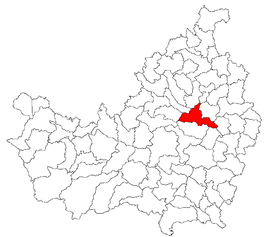Bonțida
Bonțida | |
|---|---|
 The Bánffy Castle | |
 Location in Cluj County | |
 Bonțida Location in Romania | |
| Coordinates: 46°54′N 23°48′E / 46.900°N 23.800°ECoordinates: 46°54′N 23°48′E / 46.900°N 23.800°E | |
| Country | Romania |
| County | Cluj |
| Established | 1263 |
| Subdivisions | Bonțida, Coasta, Răscruci, Tăușeni |
| Government | |
| • Mayor (2020–2024) | Emil Cărhaț[1] (PNL) |
| Area | 80.38 km2 (31.03 sq mi) |
| Population (2011)[2] | 4,856 |
| • Density | 60/km2 (160/sq mi) |
| Time zone | EET/EEST (UTC+2/+3) |
| Area code | +40 x64 |
| Vehicle reg. | CJ |
| Website | www |
| Wikimedia Commons has media related to Bonțida, Cluj. |
Bonțida (Romanian pronunciation: [bonˈt͡sida]; Hungarian: Bonchida, pronounced [ˈbont͡shidɒ], transl. "Bonc's bridge"; German: Bonisbruck) is a commune in Cluj County, Transylvania, Romania. It is known as the home of a Baroque castle owned by the Bánffy family (of which Miklós Bánffy was a member); partly destroyed during World War II and neglected by the communist regime in Romania, it is currently being restored.
The Bánffy family had another castle in Răscruci, which is part of Bonțida and also the birthplace of poet Albert Wass. The Răscruci castle features in the reminiscences of an English governess, Florence Tarring, who worked for one of the branches of the Bánffy family during the First World War (1914-1919).[3]
The commune is composed of four villages: Bonțida, Coasta (Gyulatelke), Răscruci (Válaszút) and Tăușeni (Marokháza).
Demographics[]
According to the census from 2002 there was a total population of 4,722 people living in this town. Of this population, 65.07% are ethnic Romanians, 19.10% are ethnic Hungarians and 15.75% ethnic Romani.[4]
Natives[]
See also[]
References[]
- ^ "Results of the 2020 local elections". Central Electoral Bureau. Retrieved 11 June 2021.
- ^ "Populaţia stabilă pe judeţe, municipii, oraşe şi localităti componenete la RPL_2011" (in Romanian). National Institute of Statistics. Retrieved 4 February 2014.
- ^ Florence Tarring (2010). Elizabeth Watson (ed.). Miss Tarring's War. ISBN 978-1-921586-20-0.
- ^ "Structura Etno-demografică a României".
- Communes in Cluj County
- Localities in Transylvania
- Bánffy family

